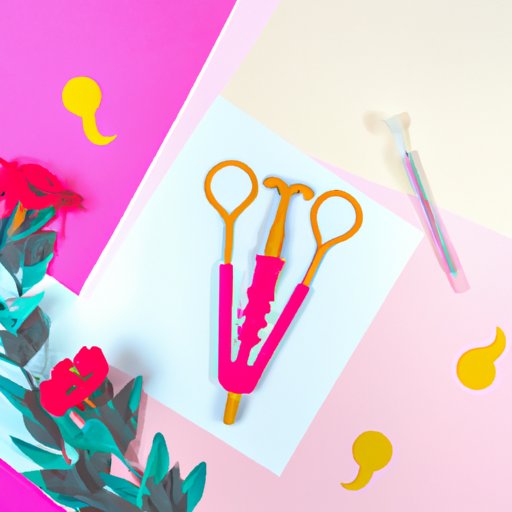Introduction
When it comes to birth control, intrauterine devices (IUDs) are becoming a popular choice for many women. However, if you’ve decided to remove your IUD, you may be wondering how long it will take to get pregnant afterward. This article provides an overview of how long it takes to get pregnant after IUD removal, as well as the various factors that can affect your timeline.

An Overview of How Long it Takes to Get Pregnant After IUD Removal
Understanding the basics of IUD removal is essential before diving into the timeline for getting pregnant after the procedure. An IUD is a small, T-shaped device that is inserted into the uterus by a healthcare professional. The device is designed to prevent pregnancy by releasing either copper or hormones into the uterus. Copper IUDs work by creating an environment in the uterus that is not conducive to fertilization, while hormonal IUDs release progestin, which thickens cervical mucus to prevent sperm from reaching the egg.
In most cases, the process of getting pregnant after IUD removal is relatively straightforward. Once the device has been successfully removed, you should be able to conceive within a few months. However, there are a variety of factors that can influence your timeline, so it is important to understand these before making any assumptions about how long it will take to become pregnant.
Exploring the Factors That Impact Timeframe for Getting Pregnant After IUD Removal
When it comes to understanding the timeframe for getting pregnant after IUD removal, there are a few physical factors that you should consider. For example, if you have had the device in place for a long time, your body may need time to adjust to its absence. Additionally, if you have experienced any trauma to the uterus or cervix during the removal process, this could potentially delay the process of conception.
Age is another factor that can impact the timeline for getting pregnant after IUD removal. Women under the age of 35 tend to have an easier time conceiving after removal than those over 35, as fertility typically declines with age. Additionally, overall health and lifestyle factors can play a role in determining how long it may take to get pregnant after IUD removal.

Comparing Different Types of IUDs and their Impact on Conception
The type of IUD that you have will also affect the timeline for getting pregnant after removal. Hormonal IUDs release the hormone progestin, which can suppress ovulation and make it more difficult to conceive. Copper IUDs, on the other hand, do not contain any hormones, so they are less likely to interfere with ovulation.
It is important to note that both types of IUDs can cause changes to the uterine lining, which can delay the process of conception. Additionally, hormonal IUDs can cause changes to the cervical mucus, which can also make it more difficult to get pregnant. Therefore, it is important to keep these factors in mind when estimating the timeline for getting pregnant after IUD removal.

Investigating the Potential Complications of IUD Removal
Although IUD removal is generally a safe and effective procedure, there are some potential risks and complications that you should be aware of. In some cases, the procedure can cause pain or discomfort, as well as bleeding or infection. If you experience any of these symptoms, you should contact your healthcare provider right away.
Additionally, if you are considering getting pregnant soon after IUD removal, it is important to understand that the procedure can sometimes cause scarring or damage to the uterus. This can affect the ability to conceive, so it is important to discuss this possibility with your doctor before removal.
Examining the Role of Fertility Treatments in IUD Removal and Conception
In some cases, fertility treatments may be necessary to help you conceive after IUD removal. Assisted reproductive technologies such as in vitro fertilization (IVF) can be used to increase the chances of a successful pregnancy. Additionally, certain medications may be prescribed to help regulate your hormone levels and improve your chances of conceiving.
Understanding the Role of Hormones in Regulating Fertility After IUD Removal
Hormones play an important role in regulating fertility after IUD removal. Your body needs to produce the correct amount of hormones in order for ovulation and implantation to occur. If your hormone levels are off balance, it can affect your ability to conceive.
Therefore, it is important to monitor your hormone levels after IUD removal and speak to your doctor if you notice any abnormalities. Additionally, it is important to ensure that your diet and lifestyle are healthy, as this can help to support your body’s natural hormone production.
Conclusion
IUD removal is a relatively simple procedure, but it can have a major impact on your fertility. Generally speaking, it should take no longer than a few months to become pregnant after removal, although this timeline can be affected by various factors such as age, overall health, and the type of IUD. Additionally, fertility treatments may be necessary in some cases to help you conceive. Ultimately, it is important to speak to your doctor about your individual situation so you can make an informed decision about your fertility and IUD removal.
If you have any questions or concerns about getting pregnant after IUD removal, we recommend speaking to your healthcare provider. They can provide further information and advice to help you make the best decisions for your fertility.
(Note: Is this article not meeting your expectations? Do you have knowledge or insights to share? Unlock new opportunities and expand your reach by joining our authors team. Click Registration to join us and share your expertise with our readers.)
